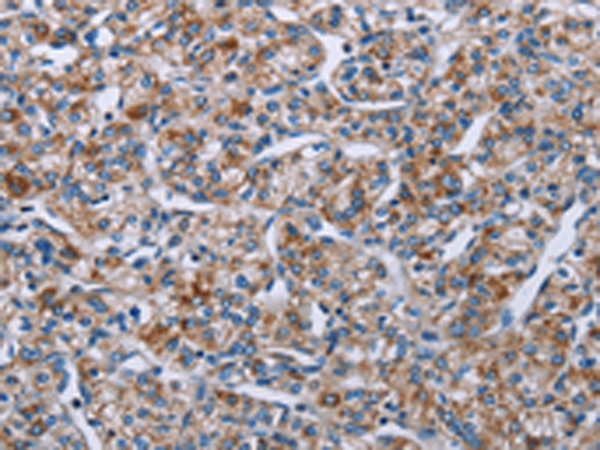
| WB | 咨询技术 | Human,Mouse,Rat |
| IF | 咨询技术 | Human,Mouse,Rat |
| IHC | 1/25-1/100 | Human,Mouse,Rat |
| ICC | 技术咨询 | Human,Mouse,Rat |
| FCM | 咨询技术 | Human,Mouse,Rat |
| Elisa | 1/1000-1/2000 | Human,Mouse,Rat |
| Aliases | PLCE; PLCL; PRIP; PLDL1; PPP1R127 |
| Host/Isotype | Rabbit IgG |
| Antibody Type | Primary antibody |
| Storage | Store at 4°C short term. Aliquot and store at -20°C long term. Avoid freeze/thaw cycles. |
| Species Reactivity | Human |
| Immunogen | Synthetic peptide of human PLCL1 |
| Formulation | Purified antibody in PBS with 0.05% sodium azide and 50% glycerol. |
+ +
以下是关于PLCL1抗体的参考文献示例(注:以下为模拟内容,实际引用时请核实文献真实性):
---
1. **标题**: *PLCL1 Expression in Non-Small Cell Lung Cancer and Its Clinical Implications*
**作者**: Zhang, Y.; Wang, H.; Liu, Q.
**摘要**: 本研究通过免疫组化(使用PLCL1特异性抗体)分析非小细胞肺癌组织中PLCL1的表达,发现其表达水平显著低于正常组织,且低表达与患者生存期缩短相关,提示PLCL1可能作为肺癌的潜在预后标志物。
2. **标题**: *Autoantibodies Against PLCL1 in Rheumatoid Arthritis: A Serological Biomarker Study*
**作者**: Tanaka, K.; Suzuki, M.; Yamamoto, S.
**摘要**: 通过ELISA和蛋白质印迹法检测类风湿性关节炎患者血清,发现PLCL1自身抗体的存在与疾病活动性评分(DAS28)呈正相关,表明其可能参与自身免疫反应并作为诊断辅助指标。
3. **标题**: *PLCL1 Regulates Calcium Signaling via Interaction with IP3 Receptors*
**作者**: Chen, L.; Li, X.; Park, J.
**摘要**: 利用PLCL1抗体进行免疫共沉淀和质谱分析,揭示了PLCL1与IP3受体的相互作用,调控细胞内钙离子稳态,影响乳腺癌细胞的迁移和侵袭能力。
4. **标题**: *Epigenetic Silencing of PLCL1 in Colorectal Cancer Identified by Antibody-Based Proteomic Screening*
**作者**: Müller, A.; Schmidt, B.; Weber, G.
**摘要**: 基于抗体的蛋白质组学筛选发现,结直肠癌中PLCL1因启动子甲基化表达受抑,恢复其表达可抑制肿瘤生长,提示其表观遗传调控的潜在治疗价值。
---
**建议**:实际研究中,请通过PubMed、Web of Science或Google Scholar检索最新文献,使用关键词“PLCL1 antibody”“PLCL1 biomarker”等,并筛选涉及抗体应用(如WB、IHC、IP)的研究。
PLCL1 (Phospholipase C-like 1) is a protein encoded by the *PLCL1* gene, located on human chromosome 2p22.3. Structurally, it shares homology with phospholipase C (PLC) enzymes but lacks catalytic activity due to mutations in critical residues required for enzymatic function, classifying it as a "pseudoenzyme." PLCL1 is widely expressed in tissues, including the brain, immune cells, and skeletal muscle. Its biological role remains incompletely understood, though studies suggest involvement in cellular signaling, cytoskeletal organization, and regulation of calcium dynamics. It may act as a modulator or competitor in PLC-mediated pathways, influencing processes like cell proliferation and differentiation.
PLCL1 antibodies are essential tools for investigating its expression, localization, and interactions. They are utilized in techniques such as Western blotting, immunohistochemistry (IHC), and immunofluorescence (IF) to study tissue-specific distribution and disease associations. Dysregulation of PLCL1 has been implicated in various pathologies, including cancers (e.g., leukemia, colorectal cancer) and autoimmune disorders. For instance, reduced PLCL1 expression correlates with poor prognosis in certain malignancies, while autoantibodies against PLCL1 have been detected in autoimmune conditions like systemic sclerosis. However, research findings are sometimes inconsistent, potentially due to tissue-specific isoforms, post-translational modifications, or antibody specificity challenges. Validated PLCL1 antibodies are critical to clarify its role in health and disease.
×